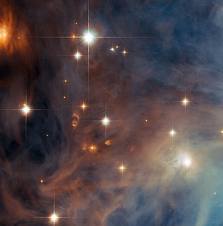Posted on March 4, 2022
This is an update of my post published on March 4, 2011:
Back in the good old days of astronomy, when telescopes were fairly new-fangled, and people had only been using them to study the skies for a century or two (merely!), it was soooo much easier to make discoveries!
Now everything is all discovered, and named, and cataloged. There’s nothing more to discover. Right?
Absolutely wrong! We are still making larger telescopes, and we are putting some of them into outer space, above our atmosphere, and we are making some that observe different wavelengths of light, and we are arranging some in Very Large Arrays. Plenty of people are making discoveries, including some amateurs and even kids!
Also, we can communicate our discoveries much more quickly—and we can find out if our “new thing” is really an old, already discovered, already cataloged thing. That task wasn’t so easy back in William Herschel’s time.
William Herschel, a British astronomer, was very careful not to catalog and “name” (that is, give a number label to) anything he observed that had already been named in Messier’s famous catalog. However, he messed up a bit on this particular occasion, on March 4, 1774. He gave the nebula the number H III.I – but it had already been named Messier 43, and it had even earlier than that been discovered by Jacques de Mairan. If Herschel had had the internet, with its almost instant communications and powerful search engines, he’d have known about the earlier sightings and labelings!
 |
This is the entire Orion Nebula. Messier 43 is the small comma- shaped dab on the left side of the larger Messier 42. |
 |
Here is another photo of Messier 42 & 43, taken by the Hubble Space Telescope. |
 |
| This is just Messier 43. |
By the way…
Messier’s catalog was a list of fuzzy patches of light, as opposed to points of light, as the stars appear to be. Most Messier objects, we now know, are nebulas or galaxies. Do you know the difference?
Nebulas are clouds of gas and dust that lie between the stars. We can only see nebulas that are lit up by stars within (or behind) the gas cloud, or that block light coming from a lit-up nebula.
Galaxies, on the other hand, are huge collections of stars planets and nebulas and other astronomical bodies. Our solar system is a part of the Milky Way Galaxy.

Phil Plait, the Bad Astronomy guy, wrote an article about this nebula.
Also on this date:
Henry the Navigator’s birthday
March Forth on March Fourth
Vermont Celebrates Statehood
Plan ahead:
Check out my Pinterest boards for:
-
March holidays
-
March birthdays
-
Historical anniversaries in March
And here are my Pinterest boards for:
-
April holidays
-
April birthdays
-
Historical anniversaries in April

















